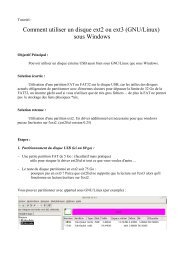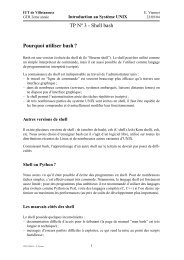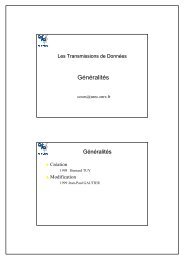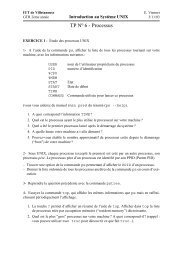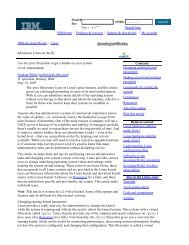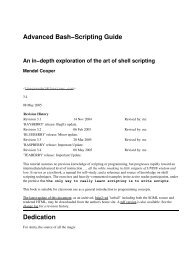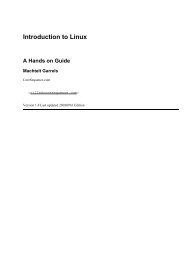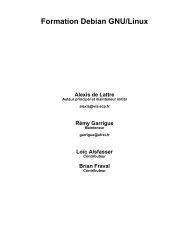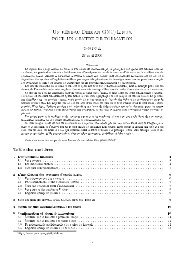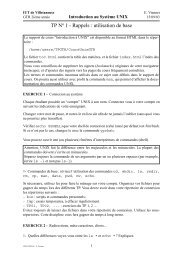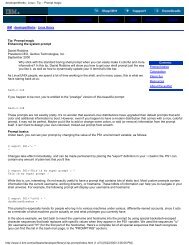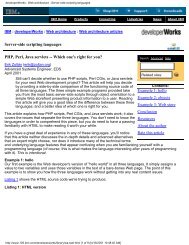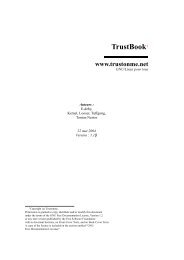Tcl/Tk quick start - Free
Tcl/Tk quick start - Free
Tcl/Tk quick start - Free
You also want an ePaper? Increase the reach of your titles
YUMPU automatically turns print PDFs into web optimized ePapers that Google loves.
Presented by developerWorks, your source for great tutorials<br />
ibm.com/developerWorks<br />
a variable from another scope. This permits calling by name into procedures, which is handy<br />
when the procedure needs to be able to modify the value at another scope, rather than just<br />
using it. The command syntax is upvar level $VarName LocalVar, where level is the<br />
number of steps up out of the current scope. "#0" is the representation of the global scope<br />
level.<br />
Data structures in <strong>Tcl</strong><br />
Beyond simple multi-dimensional arrays, it is generally recommended that <strong>Tcl</strong> data structures<br />
be implemented as arrays that have dedicated procedural interfaces. This design hides<br />
specific implementation details from the user of the structures, while providing the ability to<br />
perform significant error checking capabilities.<br />
In the example below, after declaring uData as a global variable, the code executes a check<br />
to see that the account doesn't already exist. If it does, then the procedure returns with a<br />
(non-zero) error message. The return can be used in a switch to generate error text output.<br />
For the example, we simply feed it three sequential inputs, including one repeat. This yields<br />
the output shown at the bottom, with the '1' indicating a purposeful error return due to a<br />
repeating account name.<br />
#!/usr/bin/tclsh<br />
#<br />
# Demonstrate Data Structures<br />
# using procedural wrappers<br />
proc UserAdd { Acct rName eMail phone } {<br />
global uData<br />
if {[info exists uData($Acct,rname)]} {<br />
return 1<br />
}<br />
set uData($Acct,rname) $rName<br />
set uData($Acct,email) $eMail<br />
set uData($Acct,phone) $phone<br />
return 0<br />
}<br />
puts stdout [UserAdd bpb\<br />
Brian bilbrey@junk.com 555-1212]<br />
puts stdout [UserAdd tom\<br />
Tom tom@junk.com 555-1212]<br />
puts stdout [UserAdd bpb\<br />
Brian bilbrey@junk.com 555-1212]<br />
******<br />
~/tcltk$ ./datas.tcl<br />
0<br />
0<br />
1<br />
Other possibilities for data structures include lists of arrays, linked or doubly-linked arrays, or<br />
various permutations thereof. The lists of arrays construct are considerably more efficient<br />
with the list reimplementation that accompanied <strong>Tcl</strong> 8.0, providing constant access times.<br />
Paths and files<br />
File and path operations are a challenging problem in a cross-platform environment. <strong>Tcl</strong> uses<br />
UNIX pathnames (separated using the '/' character by default), as well as the native<br />
<strong>Tcl</strong>/<strong>Tk</strong> <strong>quick</strong> <strong>start</strong> Page 12 of 29



